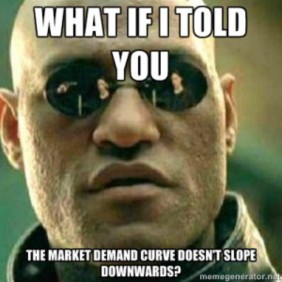On the irrelevance of general equilibrium theory
Lars Syll
“ The general equilibrium approach starts with individual decisions. It assumes that trades are voluntary and that there exist mutually advantageous opportunities of exchange. Up to here, everyone can agree. The problem lies in the next step. At this point, let us folllow David Kreps’s (1990) reasoning in his A Course in Microeconomic Theory. Kreps asks the reader to “imagine consumers wandering around a large market square” with different kinds of food in their bags. When two of them meet, “they examine what each has to offer, to see if they can arrange a mutually agreeable trade. To be precise, we might imagine that at every chance meeting of this sort, the two flip a coin and depending on the outcome, one is allowed to propose an exchange, which the other may either accept or reject. The rule is that you can’t eat until you leave the market square, so consumers wait until they are sat isfied with what they possess” (196).
Kreps “imagines” other models of this kind. In each of them by the word “market” he means a “market square,” and he introduces rules (“flip a coin,” “nobody can leave before the end of the process”). He is aware that “exploration of more realistic models of markets is in relative infancy.” And when he speaks of “more realistic” models, he means more realistic with respect to perfect competition.

“ But the problem with perfect competition is not its “lack” of realism; it is its “irrelevancy” as it surreptitiously assumes an entity that gives prices (present and future) to price taking agents, that collects information about supplies and demands, adds these up, moves prices up and down until it finds their equilibrium value. Textbooks do not tell this story; they assume that a deus ex machina called the “market” does the job. Sorry, but we do not want to teach these absurdities. In the real world, people trade with each other, not with “the market.” And some of them, at least, are price makers. To make things worse, textbooks generally allude to some mysterious “invisible hand” that allocates goods optimally. They wrongly attribute this idea to Adam Smith and make use of his authority so that students accept this magical way of thinking as a kind of proof. Perfect competition in the general equilibrium mode is perhaps an interesting model for describing a central planner who is trying to find an efficient allocation of resources using prices as signals that guide price taker households and firms. But students should be told that the course they follow—on “general competitive analysis”—is irrelevant for understanding market economies. ”
-Emmanuelle Benicourt & Bernard Guerrien
I can’t but agree with these two eminent French mathematical economists. You could, of course, as Brad DeLong has asserted, consider modern neoclassical economics to be in fine shape “as long as it is understood as the ideological and substantive legitimating doctrine of the political theory of possessive individualism” and you manage to put a blind eye to all the caveats to its general equilibrium models — markets must be in equilibrium and competitive, the goods traded must be excludable and non-rival, etc, etc. The list of caveats soon becomes impressively large — and little value is left of “modern neoclassical economics”.
Still — almost a century and a half after Léon Walras founded neoclassical general equilibrium theory — “modern neoclassical economics” hasn’t been able to show that markets move economies to equilibria.
We do know that — under very restrictive assumptions — equilibria do exist, are unique, and are Pareto-efficient.
One however has to ask oneself — what good does that do?

As long as we cannot show, except under exceedingly special assumptions, that there are convincing reasons to suppose there are forces which lead economies to equilibria — the value of general equilibrium theory is negligible. As long as we cannot really demonstrate that there are forces operating — under reasonable, relevant and at least mildly realistic conditions — at moving markets to equilibria, there cannot really be any sustainable reason for anyone to pay any interest or attention to this theory.
A stability that can only be proved by assuming “Santa Claus” conditions is of no avail. Most people do not believe in Santa Claus anymore. And for good reasons. Santa Claus is for kids, and general equilibrium economists ought to grow up.
Continuing to model a world full of agents behaving as economists — “often wrong, but never uncertain” — and still not being able to show that the system under reasonable assumptions converges to equilibrium (or simply assume the problem away) is a gross misallocation of intellectual resources and time.
Source: Real-World Economics Rev blog, Apr 13, 2015
https://rwer.wordpress.com/2015/04/13/on-the-irrelevance-of-general-equilibrium-theory/



























